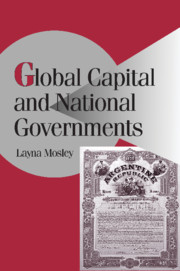Book contents
- Frontmatter
- Contents
- List of Figures and Tables
- Acknowledgments
- 1 NATIONAL GOVERNMENTS AND GLOBAL CAPITAL: A RECASTING
- 2 FINANCIAL MARKET INFLUENCE ON GOVERNMENT POLICY: THEORY AND HYPOTHESES
- 3 FINANCIAL MARKET INFLUENCE IN DEVELOPED NATIONS: AN EMPIRICAL ASSESSMENT
- 4 FINANCIAL MARKET–GOVERNMENT RELATIONS IN EMERGING MARKETS
- 5 POLITICS MEETS MARKETS: DOMESTIC RESPONSES TO FINANCIAL MARKET PRESSURES
- 6 ALTERNATIVE DOMESTIC RESPONSES: CHANGES TO FINANCIAL MARKET–GOVERNMENT RELATIONS
- 7 HISTORY REPEATING ITSELF? FINANCIAL MARKETS AND NATIONAL GOVERNMENT POLICIES BEFORE THE FIRST WORLD WAR
- 8 FINANCIAL MARKET–GOVERNMENT RELATIONS IN THE TWENTY-FIRST CENTURY
- APPENDIX 2.1 FINANCIAL MARKET INTERVIEWS
- APPENDIX 3.1 DATA DEFINITIONS AND SOURCES
- APPENDIX 3.2 FULL RESULTS FOR MACROINDICATORS MODEL
- APPENDIX 4.1 THE COMPONENTS OF THE SDDS
- APPENDIX 4.2 RATING AGENCY METHODOLOGIES
- APPENDIX 4.3 RATING AGENCY OUTCOMES, 1997
- APPENDIX 6.1 NATIONS IN CAPITAL CONTROLS DATA SET
- References
- Index
- Titles in the series
3 - FINANCIAL MARKET INFLUENCE IN DEVELOPED NATIONS: AN EMPIRICAL ASSESSMENT
Published online by Cambridge University Press: 14 January 2010
- Frontmatter
- Contents
- List of Figures and Tables
- Acknowledgments
- 1 NATIONAL GOVERNMENTS AND GLOBAL CAPITAL: A RECASTING
- 2 FINANCIAL MARKET INFLUENCE ON GOVERNMENT POLICY: THEORY AND HYPOTHESES
- 3 FINANCIAL MARKET INFLUENCE IN DEVELOPED NATIONS: AN EMPIRICAL ASSESSMENT
- 4 FINANCIAL MARKET–GOVERNMENT RELATIONS IN EMERGING MARKETS
- 5 POLITICS MEETS MARKETS: DOMESTIC RESPONSES TO FINANCIAL MARKET PRESSURES
- 6 ALTERNATIVE DOMESTIC RESPONSES: CHANGES TO FINANCIAL MARKET–GOVERNMENT RELATIONS
- 7 HISTORY REPEATING ITSELF? FINANCIAL MARKETS AND NATIONAL GOVERNMENT POLICIES BEFORE THE FIRST WORLD WAR
- 8 FINANCIAL MARKET–GOVERNMENT RELATIONS IN THE TWENTY-FIRST CENTURY
- APPENDIX 2.1 FINANCIAL MARKET INTERVIEWS
- APPENDIX 3.1 DATA DEFINITIONS AND SOURCES
- APPENDIX 3.2 FULL RESULTS FOR MACROINDICATORS MODEL
- APPENDIX 4.1 THE COMPONENTS OF THE SDDS
- APPENDIX 4.2 RATING AGENCY METHODOLOGIES
- APPENDIX 4.3 RATING AGENCY OUTCOMES, 1997
- APPENDIX 6.1 NATIONS IN CAPITAL CONTROLS DATA SET
- References
- Index
- Titles in the series
Summary
Ideologically, most people in the industry are against big government; they would rather see things provided in the private sector. But in terms of the way the market moves, it doesn't make any difference. … There really is little attention to micro-policies, which have a great impact on the lives of citizens living there, but little on the markets.
What sort of influence do investors have on the policies that affect the daily lives of citizens in advanced capitalist democracies? In this chapter, I use qualitative and quantitative evidence to evaluate the nature of the financial market influence on government policy choice in advanced industrial democracies. First, I analyze qualitative evidence regarding financial market influence in the contemporary era: is it, as I hypothesize in Chapter 2, strong and narrow for developed nations? If the constraint is narrow for developed nations, which indicators do financial market participants employ as information shortcuts? Next, I employ cross-sectional time series data to assess this expectation further. In Chapter 4, I focus on financial market–government relations in the developing world.
Qualitative Evidence and “Strong but Narrow” Financial Market Influence
International Capital Market Openness: A Background Condition
In Chapter 2, I propose that the strength of financial market influence depends on two factors: a nation's level of capital market openness and the extent to which financial market participants rely on a similar set of decision-making indicators. In terms of cross-border capital mobility, the financial market constraint is relatively strong.
- Type
- Chapter
- Information
- Global Capital and National Governments , pp. 50 - 101Publisher: Cambridge University PressPrint publication year: 2003



